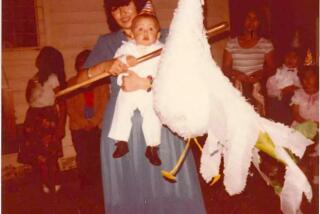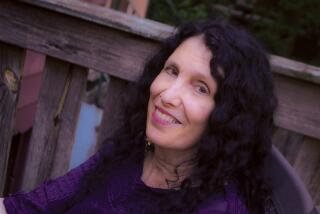Op-Ed: My mother ran an illegal numbers game, but she was also a writer
A few months before she died in 1992, when she knew her cancer was terminal but the rest of us did not, my mother sat down at the kitchen table, put on her reading glasses and opened the black binder she had been writing in for years. Then, in a private reading for my sister Rita and me, Mama read her novella aloud for the first time, speaking in a low, confident voice.
This is how her story began: “As the bus rolled along the Kentucky road nearing the Tennessee borderline, many thoughts filled the mind of Rose Miller, 15 years old, beautiful, pregnant and running away from home.”
I was so impressed. My mother, without ever taking a writing class, had crafted an opening sentence that defined the main character, established the setting and dropped us into the action, complete with complication and tension.
As far back as I can remember, Mama was working on the project she called “my book” — a story she’d titled “617 Crawford,” written in longhand with black and blue and green ink on unlined white paper. She had been excited to discover the term roman a clef, because it described what she was attempting: a novel based on real events and real people she’d known and heard about in her youth.
Mama was the first writer I ever knew, and she is almost certainly the reason I am a writer today.
My mother had to write in her spare time, and there was very little of that. Not only was she running a household that consisted of a husband, five children and a grandson, she also ran a demanding (and illegal) home-based business as a high-ranking “number runner” — a banker who collected bets and paid off wins for the informal lottery business known as “the numbers.”
How my mom found time to write at all is a marvel. She mostly worked on her book while on vacation in places such as Miami or Aruba or Las Vegas. While sitting at a hotel-room desk or lounging on the beach, she filled in the blank pages in her black binder. Over the years, my mother accrued a total of 43 handwritten pages.
Mama was the first writer I ever knew, and she is almost certainly the reason I am a writer today. Yet, in nearly every way, she was an improbable person to take up a pen. Born in 1928 in Nashville, the ninth of 10 children, she had no more than a high school education. She was a mother and wife by age 18, and had three children by 1955, when she and my father joined the Great Migration and moved to Michigan, where I was born. They had lean years while my father couldn’t find steady work in Detroit’s auto plants.
After my mother launched her numbers business, our lives improved and we moved to a four-bedroom brick Colonial house in a good West Side neighborhood. Still, Mama did not, as Virginia Woolf advised female writers to do, create a room of her own in which to write. Instead, she carved out a space at the dining room table, under the crystal chandelier, to run her numbers business — creating for us, her family, what I think of as a blue-collar, black-bourgeois life.
Enter the Fray: First takes on the news of the minute »
Mama’s writing was born out of her voracious reading. She loved history, facts and metaphysics. Our den’s bookshelves were crowded with books of every sort: World Book Encyclopedias, the collected writings of W.E.B. Du Bois (her favorite author), books by psychic Edgar Cayce, the Bible. Throughout the day, she also carried that morning’s Detroit Free Press with her, reading it front-to-back in the process.
Today, my mother’s soft, black binder sits on the shelf behind the desk where I write. Its back cover is gone and the ink on its stained pages is starting to fade. No matter. Its presence remains more valuable to me than any one of the hundreds of books I’ve read in my lifetime. The magic of what lay within the pages of that black binder set my own course in life: Growing up seeing my mother working on a book gave me permission to become a writer.
I thank Mama for the gift of a writing life, for showing me through example that writing — putting down one word after the other — is a drumbeat toward eternity. Words live on. And, through lovely cursive handwriting that moved across dozens of white pages, so does my mom — Fannie Mae Drumwright Davis Robinson. Writer.
Bridgett M. Davis is the author, most recently, of “The World According to Fannie Davis: My Mother’s Life in the Detroit Numbers.” She will be appearing at the L.A. Times Festival of Books on Sunday at noon on a panel titled “Memoir: Voices of the Black American Experience.”
More to Read
A cure for the common opinion
Get thought-provoking perspectives with our weekly newsletter.
You may occasionally receive promotional content from the Los Angeles Times.






